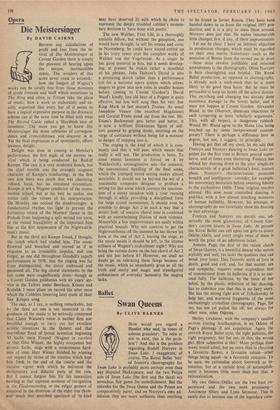Opera
Die Meistersinger
By DAVID CAIRNS
BEYOND any calculations of profit and loss from the re- vival of Die Meistersinger at Covent Garden there is simply the pleasure of hearing again
the unique, inexhaustible music. The wonders of this score never cease to astonish: how the longest of Wagner's works can be totally free from those moments of crude formula and bluff which sometimes in The Ring and often in Tristan take the place of music; how a work so elaborately and ex- actly organised that every bar of it seems to have a logical expressive purpose in the dramatic scheme can at the same time be filled with what The Record Guide called a 'Haydnish ease of invention.' The more you get to know Die Meistersinger the more subtleties of correspon- dence and cross-reference you discover in it. Yet the final impression is of spontaneity, effort- lessness, delight.
Delight was slow in coming at Monday's performance, the first night of the current re- vival which is being conducted by Rudolf Kempe. The cast is a very moderate bunch, but the chief trouble was the strangely stagnant character of Kempe's conducting: in the first two acts there was much that was charming, refined, lucid, but no sustained momentum. Kempe is not a Wagner conductor of the monu- mental school, but at his best he makes one notice only the virtues of his interpretation. On Monday one noticed the disadvantages: a fundamental rhythm too light to prevent the fortissimo return of the Masters' theme in the Prelude from happening a split second too soon, or the virtual inaudibility of the important bass line at the first appearance of the Nightwatch- man's music.
But in the third act Kempe found, I thought, the touch which had eluded him. The music flowered and breathed and moved as if in response to an irresistible impulse, and one forgot, as one did throughout Goodall's superb performances in 1958, that the singing was far from distinguished; the music embraced and pardoned all. The big choral statements in the last scene were magnificently done—though as a Covent Garden guildsman with six years' ser- vice in the Tailors under Beecham, Krauss and Kubelik I must place on record the utter mess which the Cobblers (entering late) made of their San' Krispin song.
The cast, as I say, is nothing remarkable, but by the third act one is too immersed in the greatness of the music to be seriously concerned that -Claire Watson's voice is neither firm nor beautiful enough to carry out her excellent artistic intentions in the Quintet and that marvellous flood of lyrical invention beginning '0 Sachs, mein Freund' (Wagner in excelsis)
or that Otto Wiener, the highly competent but prosaic Sachs, sings with a monotonous hard- ness of tone. Herr Wiener finished by winning our respect by virtue of the stamina which kept him fresh to the end of the course and the incisive vigour with which he delivered the declamatory and didactic parts of the role. But I cannot forgive him for his insensitive
bawling at that supreme moment of recognition in the Fliedermonolog, or the vulgar gesture of dismissal in the direction of the elder tree (how- ever much that wretched specimen of 'is kind may have deserved it) with which be chose to represent the deeply troubled cobbler's momen- tary decision to 'have done with. poetry.'
The new Walther, Fritz Uhl, is a thoroughly amiable fellow, but without the gumption, one would have thought, to sell his estates and come to Nuremberg; he could have stayed curled up in his ivory tower over the complete works of Walther von der Vogelweide. As a singer he has good material in him, but it needs develop- ing; at present he makes rather a mouthful of his phrases. John Dobson's David is also a promising sketch rather than a performance (oh for a national opera system which allows singers to grow into new roles in smaller houses before coming to Covent Garden!). David Ward's kindly, lost old bear of a Pogner is quite effective, but less well sung than his very fine King Mark in last season's Tristan. As usual Josephine Veasey (the excellent Magdalene) and Geraint Evans stand out from the rest. Mr. Evans's Beckmesser gets better and better; it is now a brilliant Dickensian figure of self- love gnawed by griping doubt, strutting on the verge of caricature without being for a moment in danger of stepping into it.
The staging is the kind of which it is com- monly said that it will pass, which means that really it will not. The production is lame. To some extent lameness is forced on it by Wakhevitch's unimaginative sets—for instance, the conventional handling of the final scene, which the cramped tiered setting makes almost inevitable. It should not be beyond the wit of a reasonably competent designer to produce a setting for this scene which conveys the spacious- ness of a sunny meadow with a river running through it while providing a disciplined form for large crowd movements. It should even be possible to design Act 2 in such a way that a secure body of massive choral tone is combined with an overwhelming illusion of mob violence. Meanwhile a few improvements are easily within practical bounds. Why not contrive to get the Nightwatchman off the moment he has blown his horn at the end of Act 2, leaving the stage, as the music insists it should be left, to the intense stillness of Wagner's midsummer night? Why not bring the curtain down on the last chord of Act 2 and not just before it? However, we shall no doubt go on tolerating these things because of the music, which so abundantly gives us all the truth and sanity and magic and transfigured ordinariness of everyday humanity the staging lacks.


































 Previous page
Previous page